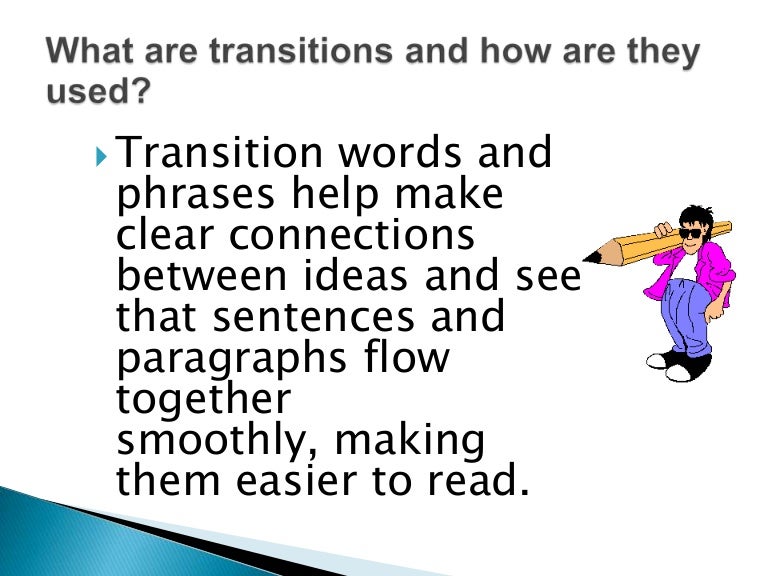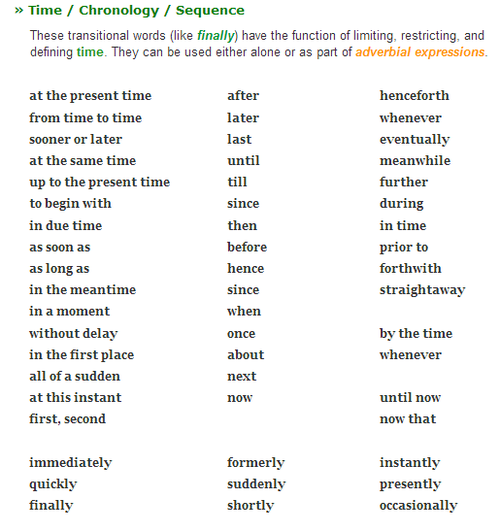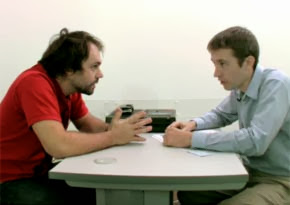
Transitional Words & Phrases
Using transitional words and phrases in IELTS Writing
Use of Transition words and phrases helps papers read more smoothly, and at the same time allows the reader to flow more smoothly from one point to the next.
Transitions enhance logical organization and understandability
and improve the connections between thoughts. They indicate relations,
whether within a sentence, paragraph, or paper.
This list illustrates categories of “relationships” between ideas,
followed by words and phrases that can make the connections:
Addition:
also, again, as well as, besides, coupled with, furthermore, in addition, likewise, moreover, similarly
When there is a trusting relationship coupled with positive reinforcement, the partners will be able to overcome difficult situations.
Consequence:
accordingly, as a result, consequently, for this reason, for this purpose,
hence, otherwise, so then, subsequently, therefore, thus, thereupon, wherefore
Highway traffic came to a stop as a result of an accident that morning.
Contrast and Comparison:
contrast, by the same token, conversely, instead, likewise,
on one hand, on the other hand, on the contrary, rather,
similarly, yet, but, however, still, nevertheless, in contrast
The children were very happy. On the other hand, and perhaps more importantly, their parents were very proactive in providing good care.
Direction:
here, there, over there, beyond, nearly, opposite, under, above,
to the left, to the right, in the distance
She scanned the horizon for any sign though in the distance she could not see the surprise coming her way.
Diversion:
by the way, incidentally
He stumbled upon the nesting pair incidentally found only on this hill.
Emphasis
above all, chiefly, with attention to, especially, particularly, singularly
The Quakers gathered each month with attention to deciding the business of their Meeting.
Exception:
aside from, barring, beside, except, excepting, excluding, exclusive of, other than, outside of, save
Consensus was arrived at by all of the members exclusive of those who could not vote.
Exemplifying:
chiefly, especially, for instance, in particular, markedly, namely,
particularly, including, specifically, such as
Some friends and I drove up the beautiful coast chiefly to avoid the heat island of the city.
Generalizing:
as a rule, as usual, for the most part, generally, generally speaking, ordinarily, usually
There were a few very talented artists in the class, but for the most part the students only wanted to avoid the alternative course.
 Illustration:
Illustration:
for example, for instance, for one thing, as an illustration,
illustrated with, as an example, in this case
The chapter provided complex sequences and examples illustrated with a very simple schematic diagram.
Similarity:
comparatively, coupled with, correspondingly, identically, likewise, similar, moreover, together with
The research was presented in a very dry style though was coupled with examples that made the audience tear up.
Restatement:
in essence, in other words, namely, that is, that is to say, in short, in brief, to put it differently
In their advertising business, saying things directly was not the rule. That is to say, they tried to convey the message subtly though with creativity.
Sequence:
at first, first of all, to begin with, in the first place, at the same time,
for now, for the time being, the next step, in time, in turn, later on,
meanwhile, next, then, soon, the meantime, later, while, earlier,
simultaneously, afterward, in conclusion, with this in mind,
The music had a very retro sound but at the same time incorporated a complex modern rhythm.
Summarizing:
after all, all in all, all things considered, briefly, by and large, in any case, in any event,
in brief, in conclusion, on the whole, in short, in summary, in the final analysis,
in the long run, on balance, to sum up, to summarize, finally
She didn’t seem willing to sell the car this week, but in any case I don’t get paid until the end of the month.

Transition Words and Phrases
This structured list of commonly used English transition words — approximately 200, can be considered as quasi complete. It can be used (by students and teachers alike) to find the right expression. English transition words are essential, since they not only connect ideas, but also can introduce a certain shift, contrast or opposition, emphasis or agreement, purpose, result or conclusion, etc. in the line of argument.
The transition words and phrases have been assigned only once to somewhat artificial categories, although some words belong to more than one category.
There is some overlapping with preposition and postposition, but for the purpose of clarity and completeness of this concise guide, I did not differentiate.
Agreement / Addition / Similarity
The transition words like
also, in addition, and, likewise,
add information,
reinforce ideas, and
express agreement with preceding material

.
in the first place
not only … but also

as a matter of fact
in like manner
in addition

coupled with
in the same fashion / way
first, second, third
in the light of
not to mention

to say nothing of
equally important
by the same token
again
together with
of course
likewise
comparatively
correspondingly
similarly
furthermore
additionally
Opposition / Limitation / Contradiction
Transition phrases like
but,
rather and
or, express that there is evidence to the
contrary or point out
alternatives, and thus introduce a change the line of reasoning
(and) yet

while
albeit
besides
as much as
even though
although
instead
whereas
despite
conversely
otherwise
however
rather
List of Transition Words
Transition Words are also sometimes called (or put in the category of) Connecting Words.
Usage of Transition Words in Essays
Transition words and phrases are vital devices for
essays, papers or other literary compositions. They improve the connections and transitions between sentences and paragraphs. They thus give the text a logical organization and structure (see also: a
List of Synonyms).
All English
transition words and
phrases (sometimes also called ‘conjunctive adverbs’) do the same work as
coordinating conjunctions: they connect two words, phrases or clauses together and thus the text is easier to read and the coherence is improved.
Usage: transition words are used with a special rule for
punctuation: a semicolon or a period is used after the first ‘sentence’, and a comma is almost always used to set off the transition word from the second ‘sentence’.
Example 1:
People use 43 muscles when they frown; however, they use only 28 muscles when they smile.
Example 2:
However, transition words can also be placed at the beginning of a new paragraph or sentence – not only to indicate a step forward in the reasoning, but also to relate the new material to the preceding thoughts.
Use a semicolon to connect sentences, only if the group of words on either side of the semicolon is a complete sentence each (both must have a subject and a verb, and could thus stand alone as a complete thought).]]>
 al to understand how Linking Words, as a part of speech, can be used to combine ideas in writing – and thus ensure that ideas within sentences and paragraphs are elegantly connected – for the benefit of the reader. This will help to improve your writing
(e.g. essay, comment, summary (scientific) review, (research) paper, letter, abstract, report, thesis, etc.).
It is also fundamental to be aware of the sometimes subtle meaning of these “small” words within the English language.
al to understand how Linking Words, as a part of speech, can be used to combine ideas in writing – and thus ensure that ideas within sentences and paragraphs are elegantly connected – for the benefit of the reader. This will help to improve your writing
(e.g. essay, comment, summary (scientific) review, (research) paper, letter, abstract, report, thesis, etc.).
It is also fundamental to be aware of the sometimes subtle meaning of these “small” words within the English language.






 .
.
 as a matter of fact
in like manner
in addition
as a matter of fact
in like manner
in addition
 coupled with
in the same fashion / way
first, second, third
in the light of
not to mention
coupled with
in the same fashion / way
first, second, third
in the light of
not to mention
 to say nothing of
equally important
by the same token
to say nothing of
equally important
by the same token
 while
albeit
besides
as much as
even though
while
albeit
besides
as much as
even though

 ation and Training in Coimbatore.
Lingua World offers the best IELTS Training in Coimbatore.
ation and Training in Coimbatore.
Lingua World offers the best IELTS Training in Coimbatore.
 Both versions of IELTS (Academic and General Training) cover all four language skills: Listening, Reading, Writing and Speaking. Here is an outline of each of the papers.
Both versions of IELTS (Academic and General Training) cover all four language skills: Listening, Reading, Writing and Speaking. Here is an outline of each of the papers.
 Task 2
You will be asked to write an essay in response to a point of view, argument or problem. The essay can be slightly more personal in style than the Academic Writing Task 2 essay.
Writing is a well-refined art requiring a great deal of preparation. The Task 1 in the Academic Stream requires the skill of interpreting the graphs and charts. Hence, we are making available to the candidates hundreds of worked-out samples and models making the task of interpreting the data a breeze.
Task 2
You will be asked to write an essay in response to a point of view, argument or problem. The essay can be slightly more personal in style than the Academic Writing Task 2 essay.
Writing is a well-refined art requiring a great deal of preparation. The Task 1 in the Academic Stream requires the skill of interpreting the graphs and charts. Hence, we are making available to the candidates hundreds of worked-out samples and models making the task of interpreting the data a breeze.
 Part 2
You will be given a card that asks you to talk about a particular topic. You will have one minute to prepare before speaking for up to two minutes. The examiner then asks you one or two questions on the same topic to finish this part of the test.
Part 3
You will be asked further questions connected to the topic in Part 2. These questions give you an opportunity to discuss more abstract issues and ideas. This part lasts between four and five minutes.
As the speaking part of the IELTS test assesses the speaking skills of the candidate special care is taken to ensure that the candidate is able to do all the three parts of the speaking test effectively and quite successfully. Test for fine tuning the skills of communication is normally conducted on a regular basis.
As a result, our candidates are heads and shoulders above others in all the four areas.
Part 2
You will be given a card that asks you to talk about a particular topic. You will have one minute to prepare before speaking for up to two minutes. The examiner then asks you one or two questions on the same topic to finish this part of the test.
Part 3
You will be asked further questions connected to the topic in Part 2. These questions give you an opportunity to discuss more abstract issues and ideas. This part lasts between four and five minutes.
As the speaking part of the IELTS test assesses the speaking skills of the candidate special care is taken to ensure that the candidate is able to do all the three parts of the speaking test effectively and quite successfully. Test for fine tuning the skills of communication is normally conducted on a regular basis.
As a result, our candidates are heads and shoulders above others in all the four areas.


 ration for the exams will defeat the purpose. The problem areas in grammar can be dealt with when the participants have difficulties in specified areas of preparation.
ration for the exams will defeat the purpose. The problem areas in grammar can be dealt with when the participants have difficulties in specified areas of preparation.

 Listening, Reading and Writing must be completed on the same day, with no breaks in between them. The order in which these tests are taken may vary.
The Speaking test will either be after a break on the same day as the other three tests, or up to a week before or after the other tests. This will depend on your test centre.
Listening, Reading and Writing must be completed on the same day, with no breaks in between them. The order in which these tests are taken may vary.
The Speaking test will either be after a break on the same day as the other three tests, or up to a week before or after the other tests. This will depend on your test centre.
